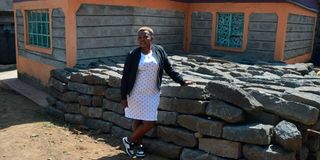Leah's journey from Dubai, Joyce's rise from Mukuru: Two domestic workers and their remarkable tales

Leah Nyokabi, a domestic worker in Dubai, outside a two-bedroom house she constructed from her domestic work pay, in Bahati, Nakuru County, in this photo taken on June 7, 2024.
What you need to know:
- Two Kenyan domestic workers have defied odds by investing their hard-earned savings into building property portfolios, becoming landlords and entrepreneurs.
- Despite facing challenges, their resilience and determination enabled them to secure loans, construct rental houses and establish businesses like salons.
As she steps into the one-eighth of an acre plot in Bahati, Nakuru, Leah Nyokabi Mburu cracks jokes with masons working overtime to meet construction deadlines.
Wearing heavy boots, she hands one of the skilled masons a brick hammer and a brickwork gauge rod that has accidentally fallen.
Leah could easily pass for one of the women selling food to construction workers building a one-bedroom house. But a close observation from the sidelines reveals she could as well be a site manager having an overview of the entire project.
She picks a dirty and worn-out construction plan and consults with the supervisor. After a conversation for about 15 minutes, she heads to a magnificent two-bedroom house already occupied.
“I’m not a construction worker. I’m here to check the progress of this project, which I’m putting up. I started by constructing my two-bedroom house and later put up two bedsitters in the same compound. This one-bedroom house is my latest project,” says Leah, a domestic worker in Dubai, the United Arab Emirates (UAE).
At 36, she has overcome numerous hurdles to become a young landlady, an achievement many of her peers are still striving for amid numerous challenges.
"Turning 36 and the life experience that comes with middle adulthood has taught me big life lessons," Leah says as she ushers us into her beautiful two-bedroom house.
"I have decided to put my young adulthood life experience to good use by becoming a landlady who works as a domestic worker. I want to prove that women working as domestic workers, both at home and abroad, can not only excel in the property sector but also outsmart men with their persistence and dedication to hard work."

Leah outside the two-bedroom house she constructed in Bahati Sub-county, Nakuru County on June 7, 2024.
"Having a roof over your head is the best feeling ever," she adds. "It feels warm and comforting because home is full of memories and continuing love."
Leah's journey began when she worked as a cleaner at the National Assembly in Nairobi, earning Sh6,500 per month. Her subsequent savings from domestic work helped her build her first house.
"To most people, house rent is often the top monthly expense. Falling behind on rent payments can lead to severe consequences ranging from public embarrassment to eviction. The monthly pressure to pay rent is directly related to the ability to pay for other basic needs, such as food and medical care, especially if you are a woman. That is why I work hard to change my status from a tenant to a landowner."
But what motivated the mother of two – a boy and a girl – to become a landlady?
"I first went to Saudi Arabia in 2012 at the age of 24," states Leah, who is currently at home on annual leave.
"I earned Sh16,000 per month, but I never knew anything about saving. I used to wire cash home to my close relatives since I was the sole breadwinner. After mastering the survival tricks, I shifted to another employer, where I was paid Sh36,000 per month."
Leah's ambitious careerism as a domestic worker in Saudi Arabia melted the heart of Ibrahim Maina, whom she met there and later married.
"Meeting Ibrahim in 'the land of the Two Holy Mosques' was a blessing to me as we pooled resources and bought two plots of one-eighth of an acre at Sh400,000 each," she says.
"I was able to save money with my husband, whom I met in Saudi Arabia, and I'm happy he's my pillar because he's 100 per cent supporting my saving culture, which has seen us construct our first house at a cost of Sh800,000."
While working in Dubai, Leah came across a video where an official of a domestic workers' association was speaking about the importance of saving and borrowing for Kenyan domestic workers abroad.
"I loved her idea of a domestic workers' Savings and Credit Cooperative (Sacco). I joined immediately and started saving. I didn't want to repeat the mistake I made of not saving for a rainy day when I first went to Saudi Arabia."
Leah, who once worked in a quarry earning Sh150 per day, says the current one-bedroom house project under construction is a result of the loans she has borrowed from the Sacco.
"So far, I have borrowed more than Sh400,000 to kick-start the projects that I have undertaken, including the construction of two one-bedroom rental houses, which bring in Sh2,400 every month each," says Leah, who has also worked in Bahrain.
"I also buy shares at the Sacco every month. Over time, Saccos can grow and expand, leading to an increase in their share value. This means my initial investment in shares could appreciate, potentially giving me a profitable return."
She has also bought another one-eighth of an acre piece of land in Mai Mahiu at Sh200,000 and another one in Nyahururu at Sh180,000. Their values have sharply appreciated.
"If I were to sell the two pieces of land in Mai Mahiu and Nyahururu, I would fetch Sh1 million as each is now going for Sh500,000, according to the latest market value."
However, Leah acknowledges that building a house while working abroad is not a walk in the park.
"The construction work may not go according to plan because of the lack of strict site supervision. The price of materials is inflated, and this makes the project costly," she explains.
"My plan is buying and owning real estate as an investment strategy because it can be both satisfying and lucrative."
About 200 kilometres from Bahati, Nakuru, the story of Joyce Mwikali is no different. When we catch up with her in Mukuru Nyayo slums, Nairobi, Joyce opens up about her life as a domestic worker for decades.

Joyce Mwikali attends to a customer on June 5, 2024 at her salon in Mukuru Nyayo in Nairobi County.
Joyce says she was devastated to learn that she was pregnant in 2002 at only 15 years old. A few months after giving birth, she realised she needed a job as her mother would not take care of her and her baby.
This is how she plunged into domestic work to make ends meet, a career she holds to date.
"The job was the easiest to get. I did not require any academic certificates and experience," Mwikali reveals.
Her starting salary as a domestic worker was Sh1,500 in a home in Nairobi West. The money, however, was not enough for her needs and those of her baby.
She still works as a house help three times a week in one of the homes on an estate near the slums.
While still working as a house help, Joyce, who always admired being a salonist, used her free time to train as a hairdresser.
"Every day after doing my work, I would go to a local salon for two hours, where I learned braiding, hairdressing, and general salon work. I slowly became an expert."
Joyce says her goal thereafter was to start her own salon, something that was held back for a while by lack of capital. However, despite the financial challenges, she managed to start a small salon at Mukuru Nyayo slums.
"I was so happy after I opened my own salon. I told myself that indeed my journey to financial freedom had started in earnest," she recounts.
However, her joy was short-lived after her salon was razed by fire in September 2023. The mother of two says she became hopeless and devastated, unsure of what to do next.
Being a member of the domestic workers’ Sacco came in handy for her.
"I am a member of the Sacco and have saved about Sh30,000. I took a loan of Sh45,000 and, together with support from my friends and well-wishers, I opened another salon in December 2023," she says.
In a day, Joyce says she makes at least Sh2,000 from the salon. The earnings, she admits, have helped her upgrade her lifestyle and stay debt-free.
Joyce, who works with her daughter in the salon, reveals that plans to open a second branch in the nearby Shimo la Tewa slums are in top gear.
"I have already finished repaying the loan I took last year, and now I want to take a bigger loan to open the new salon. My goal is to fully become self-reliant."
Her message to fellow domestic workers is not to despise themselves but rather use their work as a stepping stone to success.

Joyce Mwikali speaks to nation.africa during an interview on June 5, 2024 at her salon in Mukuru Nyayo in Nairobi.
Leah and Joyce are living testaments that with determination and hard work, domestic work can indeed be a path to financial independence. Their story mirrors that of many others in the domestic work sphere who are toiling hard to change their lives.
A recent survey on domestic workers conducted by IDAY reported that Kenya has around two million domestic workers. The survey indicated that among them, 11 to 24 per cent are under 18 years old and a considerable percentage of adult domestic workers are young, with about 80 per cent aged 18 to 30.
Since 2019, Kenya has been training 7,000 domestic workers every month for the labour export market, especially for the Gulf Cooperation Council countries of Qatar, UAE and Saudi Arabia, where Kenya has bilateral Labour Agreements for unskilled labour.
According to the International Labour Organisation, there are about 75.6 million domestic workers globally.






